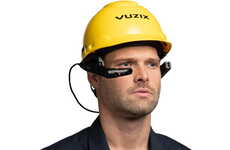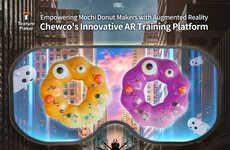
ioxp Uses Cognitive AR to Create Instructive Workplace Guides
Alyson Wyers — November 17, 2017 — Social Good
References: ioxp.de & springwise
These training manuals for manufacturers are brought to life thanks to this cognitive AR system. From The Germany Research Center for Artificial Intelligence spinoff ioxp, the cognitive augmented reality system is a new use of AR glasses. According to Springwise, the startup "develops training manuals that work with AR glasses to place step-by-step instructions directly into the field of vision of the user."
The AI and AR-combining software can quickly and easily learn about any work environment or process, and then teach it to employees. The system uses video and 3D hand-tracking to create instructional illustrations and animations with annotations that act as an educational guide for workers learning work processes. Any AR-equipped device will work with the ioxp system.
The AI and AR-combining software can quickly and easily learn about any work environment or process, and then teach it to employees. The system uses video and 3D hand-tracking to create instructional illustrations and animations with annotations that act as an educational guide for workers learning work processes. Any AR-equipped device will work with the ioxp system.
Trend Themes
1. Cognitive AR Training - The use of cognitive AR for efficient instructional guides creates room for development in manufacturing and industrial training.
2. Video-based Training Modules - Augmented reality's capability to create step-by-step learning animations with annotations opens up disruptive opportunities in employee training and development.
3. Ar-powered Innovations in Workforce Education - Integrating AR technology into traditional training methods will revolutionize education across various industries, creating opportunities for startups and small businesses alike.
Industry Implications
1. Manufacturing - Cognitive AR systems can optimize employee training, increasing efficiency and reducing workplace errors for complex manufacturing processes.
2. Education and Training - Traditional employee training modules will be disrupted by AR technology, creating opportunities for education and training providers to integrate this technology into their curriculum.
3. Industrial Automation - Incorporation of AR technology in industrial automation could lead to reduced training times for workers and ultimately minimize errors in areas where safety is a priority.
4.4
Score
Popularity
Activity
Freshness























